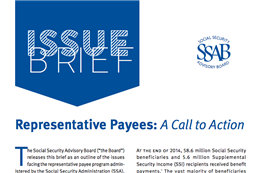 The Social Security Advisory Board calls for Congress, the Social Security Administration (SSA), and interested stakeholders to reexamine the representative payee (“payee”) program. SSA’s procedures for appointing, selecting, training, and monitoring payees should be reviewed, and a plan should be developed for identifying beneficiaries with declining financial capability.
The Social Security Advisory Board calls for Congress, the Social Security Administration (SSA), and interested stakeholders to reexamine the representative payee (“payee”) program. SSA’s procedures for appointing, selecting, training, and monitoring payees should be reviewed, and a plan should be developed for identifying beneficiaries with declining financial capability.
More than 8 million Americans receiving Social Security and Supplemental Security Income (SSI) use a representative payee to receive and manage their benefits. These beneficiaries include minor children, individuals with court-appointed guardians, and others that SSA determines are incapable of managing their benefits. Most payees are relatives, but some others include friends, nonprofit organizations, mental health facilities, and social services agencies.
As a nation, we need to create a plan to proactively identify beneficiaries that begin receiving benefits as capable adults, but later need assistance managing their benefits, such as aging seniors. With the burgeoning population of older beneficiaries, the need for a better system will only grow, and SSA is not well equipped to handle this workload. Identifying beneficiaries in need of assistance is a challenge for an agency focused primarily on ensuring that benefits are paid.
SSA faces a balancing act—ensuring oversight of payees while not overburdening them with requirements that would threaten availability. Payees managed $77 billion in benefits in 2014. As required by law, all payees must submit an annual accounting of how benefits are spent. However, information requested is so minimal that SSA rarely detects misuse. SSA investigates only a small fraction of payees on a regular basis. New proposals for SSA to monitor and detect misuse should be developed.
The payee program needs attention from Congress, advocates, researchers, the media, and the public to protect beneficiaries and ensure that those who need assistance managing their benefits receive it.